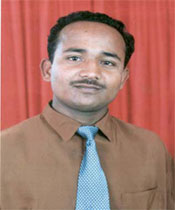Related Links
Case Updates
Krishna Adhikari
 On 6 June 2004, Krishna Prasad Adhikari, a resident of Fujel village of Gorkha District, was murdered in Chitwan District by Maoist cadres. Krishna Prasad was visiting his grandparents after having taken the SLC examinations, and he was abducted from Bakullahar Chowk by men who came on a motorcycle ...
On 6 June 2004, Krishna Prasad Adhikari, a resident of Fujel village of Gorkha District, was murdered in Chitwan District by Maoist cadres. Krishna Prasad was visiting his grandparents after having taken the SLC examinations, and he was abducted from Bakullahar Chowk by men who came on a motorcycle ... Maina Sunuwar
 Around 6 am on February 17, 2004, a group of RNA soldiers arrested Ms
Maina Sunuwar, a 15-year-old schoolgirl of Kharelthok VDC-6, Kavre
district. She disappeared since her arrest. Her family members, with
support from villagers and school where Maina was a student, visited
detention centers ...
Around 6 am on February 17, 2004, a group of RNA soldiers arrested Ms
Maina Sunuwar, a 15-year-old schoolgirl of Kharelthok VDC-6, Kavre
district. She disappeared since her arrest. Her family members, with
support from villagers and school where Maina was a student, visited
detention centers ... Sanjeev Kumar Karna
 Sanjeev Kumar Karna was one among the 11 persons arrested on October 8, 2003. On that fateful day, they had gone to attend a picnic program organized by the students at a place called Kariyachauri VDC-4, and from picnic, they went to Kataiya Chowri Area of Dhanusha district where they ate some food ...
Sanjeev Kumar Karna was one among the 11 persons arrested on October 8, 2003. On that fateful day, they had gone to attend a picnic program organized by the students at a place called Kariyachauri VDC-4, and from picnic, they went to Kataiya Chowri Area of Dhanusha district where they ate some food ... Arjun Bahadur Lama
Arjun Bahadur Lama, 48 years in age, permanent resident of Chhatrebas
VDC -5, Dapcha in Kavre district was abducted by a group of Maoist
cadres, three in number, on 29 April 2005 (2062.1.16 BS) from the
premises of Sri Krishna Secondary School at Chhatrebas VDC-1 of the
district.
» more
Hari Prasad Bolakhe
Hari Prasad Bolakhe, 35 (while missing) a permanent resident of Phulbari VDC-8, Kavre district, a pastor by profession, had been missing since the arrest December 27, 2003, was reportedly killed by security persons. A team of National Human Rights Commission discovered a human skeleton in a jungle ...
» more
Sarala Sapkota
Around 11 p.m. on July 15, 2004, a group of 12 armed soldiers arrested
Sarala Sapkota at her grandfather’s house. The family, who witnessed the
arrest, stated that soldiers gave Sarala no reason for her arrest.
After her arrest, Sarala’s family went to Baireni barracks and the DPO ...
» more
Birendra Shah
On the evening of 5 October 2007, Mr. Birendra Shah, 34, resident of Inruwasira VDC-8, Bara district, a local journalist of Bara district and correspondent of Nepal FM, Avenues Television and Dristi weekly, was abducted by Maoists from Pipara Bazaar in Kalaiya, the district headquarters of Bara ...
» more
Bishwanath Parajuli, Tom Nath Poudel and Dhan Bahadur Tamang
Three persons namely Bishwonath Parajuli (also called Nagendra
Parajuli), Tom Nath Poudel and Dhan Bahadur Tamang of Hasandaha VDC,
Morang were shot dead by the security personnel on 28 September 2004.
According to the eyewitnesses, other victims and the villagers, about 16
people were arrested ...
» more
Chot Nath Ghimire and Shekhar Nath Ghimire
Chot Nath Ghimire, a 58-year-old farmer, resident of Ishaneshor VDC-4,
Ratamate Majhpokhari of Lamjung district was allegedly arrested by the
Joint Security Forces of Joint Security Camp stationed at Bhorlatar VDC,
Lamjung district on February 2, 2002 (2058.10.20). The security camp
called Mr. ...
» more
Bhauna Tharu
Bhauna Tharu (Bhauna Chaudhary in the citizenship card), 21 years old
male (at the time of the incident; Date of Birthe: 8 September 1978),
son of Purna Bahadur Chaudhary, permanent resident of Sujanpur village,
Neulapur VDC-4, Bardiya district, and an employee of Rastriya Gobar Gas,
Gulariya, ...
» more
Review of the Universal Periodic Review recommendations-1 Torture
They made comprehensive recommendations to the government of Nepal to strengthen its approach to human rights. The outcome report of the UPR will be adopted at the 17th session of the Human Rights Council on 7 June. Prior to that event, Advocacy Forum and the Asian Human Rights Commission offer their comments on some of the central issues raised during the UPR and call for the prompt and thorough implementation of the recommendations accepted and a serious reconsideration of the recommendations rejected or simply noted as a basis for a comprehensive, credible and effective approach to human rights in Nepal.
The issue of torture remains one of the most prominent challenges to the rule of law in Nepal and Advocacy Forum and the AHRC regrets that during the Universal Periodic Review dialogue which took place on 25 January the government failed to acknowledge the importance of the challenge and to make concrete commitments in that aspect. On the contrary, the government's attitude toward this issue was an attitude of denial of the extent of the challenge and of its continuous inaction in addressing it.
Even though human rights organizations acknowledge that since the end of the conflict, the use of torture has steadily declined, especially in the hands of the Army and the Maoists, it remains widespread as a tool for confession or to extract bribes. According to a report by Advocacy Forum analyzing the recent trends and patterns of torture in Nepal, 22.5% of the 2183 detainees they have interrogated between July and December 2010 reported torture or ill-treatment, among them 13.3% of the women detainees and 26.7% of the juveniles detainees. This figure reveals a worrying increase of 6 points in the percentage of detainees claiming torture in comparison to the previous study which covered the period from January to June 2010 where the percentage was of 15.8%. In spite of repeated lip service by government officials to the end of torture, urgent efforts must be made to make it history.
The three-hour long interaction dialogue of the UPR indeed showed that the persistence of torture was still a concern among a considerable portion of the international community with several countries noting that incidences of police brutality and torture continue to take place and interrogating the government toward its intention to introduce a legislation criminalizing torture and to hold accountable public officials reported to practice torture.
Instead of making the best of the opportunity for dialogue and concerted action to make improvement in the country's human right landscape offered by this fora, the delegation expeditiously dismissed the concerns of the international community by asserting in the session that "there is no systematic torture in Nepal. There are sufficient constitutional and legal safeguards for the prevention of torture in Nepal." Both parts of this assertion are a complete denial of the reality of police torture in the country and of the inadequacy of the existing legislation to ban torture in the country by bringing the perpetrators to account and ensuring the right to redress of the victims. It is fair to say that not a single perpetrator of torture has ever faced condemnation.
Nepal has ratified the Convention against Torture, a move which was commended by several states during the UPR session which contains the obligation for the State to ensure that all acts of torture should be made offences under criminal law, which should be punishable by appropriate penalties which take into account their grave nature. Being part of the Convention against Torture also entails the obligation for the State to make sure that any individual alleging having been subjected to torture has the right to complain to and to have his case promptly and impartially examined by competent authorities.
"Regarding criminalization of torture"
A first step toward the eradication of torture should be the establishment of a legal framework effectively allowing the prosecutions of the public agents found guilty of practicing torture. Effective, specific legislation in line with international standards is needed to ban police torture from Nepal. Although article 26 of the 2007 Interim Constitution of Nepal states that acts of torture should be punishable by law, the failure to adopt such law has so far provided impunity to the perpetrators of torture.
Criminalization of torture in compliance with the requirements of the UN Convention against Torture was recommended by six countries and Nepal has accepted those recommendations. The AHRC and Advocacy Forum welcome this commitment and further urge the government to specify a timeline within which it will adopt the legislation. We in particular urge the government to guarantee that the law will clearly specify appropriate penalties for acts of torture and attempts, complicity and command responsibility in such acts, which take into account their grave nature, provide for witness and complainant protection mechanism, and establish a strong and independent body in charge of conducting the investigations.
"Regarding investigation of allegations of torture"
Several countries recommended that Nepal should take measures to prevent torture, and ensure prompt and impartial investigation and prosecutions of all alleged cases of abuses by law enforcement authorities. The government accepted those recommendations but indicated that it considered that they were already implemented or on the way of being implemented. This is without considering the numerous obstacles and flaws in the current practices of investigating allegations of torture which prevent the victims from seeking justice. Numerous cases of torture we have documented illustrate at length why the current status of "implementation" of those recommendations is, to say the least, unsatisfactory, if not inexistent.
The absence of an independent body to conduct investigations makes it extremely hard to have a complaint of torture registered, let alone have it investigated. When it is investigated, it is done by a team composed exclusively of policemen, sometimes from the same police station as the alleged perpetrators, creating a direct conflict of interests in the outcomes. In addition to that, the absence of victim and witness protection mechanisms exposes the complainants to further victimisation, as the alleged perpetrators remain in a position of power and influence to threaten them. Recent examples of the inadequacy of investigation of torture have included: the family of an 11-year old torture victim having filed a case to the court of justice continuously threatened by colleagues of the alleged perpetrators while the District Police Office refuses to provide them protection; a policeman tortured nine years ago whose only reward for attempting to find legal redress has been dismissal from his job, further torture, arbitrary arrest, continuous threats and intimidations while the perpetrators being rewarded with promotions.
We therefore call upon the government not to settle for the current state of investigation of torture in Nepal, but instead to commit to develop mechanisms to guarantee the fairness and effectiveness of inquiries. Those mechanisms should consider, but not be limited to: an effective witness and victim protection system, an independent investigative body, a separate mechanism to register the complaints of torture, provide for sanctions of public officers found of having obstructed the victim's access to justice etc... Such commitments are necessary to create an effective right to legal redress of the victims.
"Regarding ratification of OP-CAT"
One of the most widely made recommendations to Nepal concerned the ratification of the Optional Protocol to the Convention against Torture which allows for a torture prevention mechanism of regular visits of independent bodies to places of detention. The AHRC and Advocacy Forum regret that Nepal rejected that recommendation. It also rejected a recommendation made by Maldives to "designate a national preventive mechanism, to safeguard the rights of detainees and to prevent any acts of torture" and indicated that "a preventive mechanism already existed." In our joint report to the UPR mechanism, we had deplored that "Although the National Human Rights Commission is mandated to carry out visits, it has failed to do so to an acceptable level in the period in question here". The extensive work of NGOs in Nepal have demonstrated that in places of detention in which visits were regularly conducted, the incidence of torture tended to decline, thus illustrating the necessity to have such a mechanism implemented nation-wide.
Those recommendations if accepted and seriously implemented by Nepal would form the bedrock of a comprehensive approach to the eradication of torture in Nepal. It is now the responsibility of the government to take measures to implement them in good faith and in a prompt, transparent and verifiable manner.
The AHRC and Advocacy Forum will continue to closely monitor the state of implementation of those recommendations in Nepal.
« Back to overview
The issue of torture remains one of the most prominent challenges to the rule of law in Nepal and Advocacy Forum and the AHRC regrets that during the Universal Periodic Review dialogue which took place on 25 January the government failed to acknowledge the importance of the challenge and to make concrete commitments in that aspect. On the contrary, the government's attitude toward this issue was an attitude of denial of the extent of the challenge and of its continuous inaction in addressing it.
Even though human rights organizations acknowledge that since the end of the conflict, the use of torture has steadily declined, especially in the hands of the Army and the Maoists, it remains widespread as a tool for confession or to extract bribes. According to a report by Advocacy Forum analyzing the recent trends and patterns of torture in Nepal, 22.5% of the 2183 detainees they have interrogated between July and December 2010 reported torture or ill-treatment, among them 13.3% of the women detainees and 26.7% of the juveniles detainees. This figure reveals a worrying increase of 6 points in the percentage of detainees claiming torture in comparison to the previous study which covered the period from January to June 2010 where the percentage was of 15.8%. In spite of repeated lip service by government officials to the end of torture, urgent efforts must be made to make it history.
The three-hour long interaction dialogue of the UPR indeed showed that the persistence of torture was still a concern among a considerable portion of the international community with several countries noting that incidences of police brutality and torture continue to take place and interrogating the government toward its intention to introduce a legislation criminalizing torture and to hold accountable public officials reported to practice torture.
Instead of making the best of the opportunity for dialogue and concerted action to make improvement in the country's human right landscape offered by this fora, the delegation expeditiously dismissed the concerns of the international community by asserting in the session that "there is no systematic torture in Nepal. There are sufficient constitutional and legal safeguards for the prevention of torture in Nepal." Both parts of this assertion are a complete denial of the reality of police torture in the country and of the inadequacy of the existing legislation to ban torture in the country by bringing the perpetrators to account and ensuring the right to redress of the victims. It is fair to say that not a single perpetrator of torture has ever faced condemnation.
Nepal has ratified the Convention against Torture, a move which was commended by several states during the UPR session which contains the obligation for the State to ensure that all acts of torture should be made offences under criminal law, which should be punishable by appropriate penalties which take into account their grave nature. Being part of the Convention against Torture also entails the obligation for the State to make sure that any individual alleging having been subjected to torture has the right to complain to and to have his case promptly and impartially examined by competent authorities.
"Regarding criminalization of torture"
A first step toward the eradication of torture should be the establishment of a legal framework effectively allowing the prosecutions of the public agents found guilty of practicing torture. Effective, specific legislation in line with international standards is needed to ban police torture from Nepal. Although article 26 of the 2007 Interim Constitution of Nepal states that acts of torture should be punishable by law, the failure to adopt such law has so far provided impunity to the perpetrators of torture.
Criminalization of torture in compliance with the requirements of the UN Convention against Torture was recommended by six countries and Nepal has accepted those recommendations. The AHRC and Advocacy Forum welcome this commitment and further urge the government to specify a timeline within which it will adopt the legislation. We in particular urge the government to guarantee that the law will clearly specify appropriate penalties for acts of torture and attempts, complicity and command responsibility in such acts, which take into account their grave nature, provide for witness and complainant protection mechanism, and establish a strong and independent body in charge of conducting the investigations.
"Regarding investigation of allegations of torture"
Several countries recommended that Nepal should take measures to prevent torture, and ensure prompt and impartial investigation and prosecutions of all alleged cases of abuses by law enforcement authorities. The government accepted those recommendations but indicated that it considered that they were already implemented or on the way of being implemented. This is without considering the numerous obstacles and flaws in the current practices of investigating allegations of torture which prevent the victims from seeking justice. Numerous cases of torture we have documented illustrate at length why the current status of "implementation" of those recommendations is, to say the least, unsatisfactory, if not inexistent.
The absence of an independent body to conduct investigations makes it extremely hard to have a complaint of torture registered, let alone have it investigated. When it is investigated, it is done by a team composed exclusively of policemen, sometimes from the same police station as the alleged perpetrators, creating a direct conflict of interests in the outcomes. In addition to that, the absence of victim and witness protection mechanisms exposes the complainants to further victimisation, as the alleged perpetrators remain in a position of power and influence to threaten them. Recent examples of the inadequacy of investigation of torture have included: the family of an 11-year old torture victim having filed a case to the court of justice continuously threatened by colleagues of the alleged perpetrators while the District Police Office refuses to provide them protection; a policeman tortured nine years ago whose only reward for attempting to find legal redress has been dismissal from his job, further torture, arbitrary arrest, continuous threats and intimidations while the perpetrators being rewarded with promotions.
We therefore call upon the government not to settle for the current state of investigation of torture in Nepal, but instead to commit to develop mechanisms to guarantee the fairness and effectiveness of inquiries. Those mechanisms should consider, but not be limited to: an effective witness and victim protection system, an independent investigative body, a separate mechanism to register the complaints of torture, provide for sanctions of public officers found of having obstructed the victim's access to justice etc... Such commitments are necessary to create an effective right to legal redress of the victims.
"Regarding ratification of OP-CAT"
One of the most widely made recommendations to Nepal concerned the ratification of the Optional Protocol to the Convention against Torture which allows for a torture prevention mechanism of regular visits of independent bodies to places of detention. The AHRC and Advocacy Forum regret that Nepal rejected that recommendation. It also rejected a recommendation made by Maldives to "designate a national preventive mechanism, to safeguard the rights of detainees and to prevent any acts of torture" and indicated that "a preventive mechanism already existed." In our joint report to the UPR mechanism, we had deplored that "Although the National Human Rights Commission is mandated to carry out visits, it has failed to do so to an acceptable level in the period in question here". The extensive work of NGOs in Nepal have demonstrated that in places of detention in which visits were regularly conducted, the incidence of torture tended to decline, thus illustrating the necessity to have such a mechanism implemented nation-wide.
Those recommendations if accepted and seriously implemented by Nepal would form the bedrock of a comprehensive approach to the eradication of torture in Nepal. It is now the responsibility of the government to take measures to implement them in good faith and in a prompt, transparent and verifiable manner.
The AHRC and Advocacy Forum will continue to closely monitor the state of implementation of those recommendations in Nepal.
























Join Us